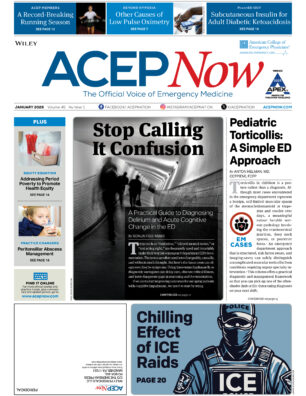Pages: 1 2 | Multi-Page
SEMPA Offers Support, Clarification for AMA President Dr. Steven Stack’s Comments on Advanced Practice Providers
Topics: ACEPAdvanced Practice ProvidersAmerican College of Emergency PhysiciansCare TeamCommentaryEmergency MedicineEmergency PhysicianOpinionPhysician ShortagesPractice ManagementPractice TrendsSEMPASociety of Emergency Medicine Physician Assistants
Related
-
Despite Drawbacks, Emergency Medicine Remains a Great Specialty
January 9, 2026 - 0 Comment -
Florida Emergency Department Adds Medication-Dispensing Kiosk
November 7, 2025 - 1 Comment -
Q&A with ACEP President L. Anthony Cirillo
November 5, 2025 - 0 Comment
Current Issue
About the Author
2 Responses to “SEMPA Offers Support, Clarification for AMA President Dr. Steven Stack’s Comments on Advanced Practice Providers”
-
The response by SEMPA concerning Dr. Stack’s article on advanced practice providers was accurate, and written in a manner showing respect for our physician colleagues.
It is important for all physicians to realize that PA’s are on the same team as physicians. PAs are educated by physicians, PAs are licensed by the same board as physicians, and PA’s are licensed to practice medicine.
It appears to me that nurses with advanced degrees want to declare independent practice under their nursing license since they are licensed by the board of nursing and not the board of medicine. It appears the only time nursing wants to associate themselves with physicians is during billing. Nurses with advanced degrees utilize medical diagnosis for billing, even though legally they should be using nursing diagnosis. Only licensed medical providers should be utilizing medical diagnosis.
it does seem ethically, morally (and maybe legally) incorrect for advanced practice nurses to utilize medical diagnosis.
David Pecora, PA
-
There is a global movement to ‘categorize’ the PA-type clinician – similar to the nurse, physician, dentist, pharmacist, etc through the International Labour Organization. There are at least 46 countries that have a non-physician/non-nurse type clinician – that are not recognized/ defined and therefore not included in health systems and health policy planning & funding. The ‘Accelerated Medically Trained Clinician’ is a descriptive categorical term that would be an umbrella over all these clinicians: clinical officer, attache’s desante, attache de sante en chirurgie, health officer, assistant medical, medical assistant, physician assistant, tecnicos de medicina, tecnicos de cirurgia, community health care officer, community health officer, clinical associate, associate medical officer, medical licentiate, associate clinician, sub-assistant community medical officer, baga emch, condensed health assistant, feldsher, physician associate, medex, health extension officer.
“These professionals are trained in the medical model, in a condensed, regionally specific, flexible and cost-effective manner. They are dynamic and responsive to the host health system, as well as population and community needs. They are team based health professionals whose development and curriculum have evolved to fill the gaps in healthcare. They are unique in that they have historical and cultural identities in the countries they serve. Because of their regional ties and titles they are not able to migrate and are seen as not only critical in the care of communities, but as a strong return on investment from a governmental view.”
Reference:
1. http://whoeducationguidelines.org/blog/call-action-accelerated-medically-trained-clinicians-and-social-determinants-health
2. Cobb N, Meckel M, Nyoni J, Mulitalo K, Guadrado H, Sumitani J, et al. “Findings from a survey of an uncategorized cadre of clinicians in 46 countries: Increasing access to medical care with a focus on regional needs since the 17th Century.” World Health and Population: Special Edition The Global Health Workforce: Striving for Equity, Tackling Challenges on the Ground. 2015;16(1) available from: http://www.longwoods.com/content/24296




This letter is in response to the article featured in the September 14, 2015, issue of ACEP Now with Kevin Klauer, DO, EJD, FACEP and Steven J. Stack, MD, FACEP, AMA President.On behalf of the Society of Emergency Medicine Physician Assistants (SEMPA), the national organization that represents all physician assistants who practice in the emergency setting, we would like to offer supportive comments and some essential clarification of the PA role in a physician-led health care team.
You Might Also Like
Explore This Issue
ACEP Now: Vol 34 – No 11 – November 2015As PAs, we wholeheartedly agree that physicians, by virtue of educational process, training, and specialty certification, are the most highly educated and trained clinicians in the health care system. We also absolutely agree with the Truth in Advertising campaign that the AMA has spearheaded. As clinicians, who also have the patient’s greatest interests at heart, PAs by law, statute, and professional ethics, attempt to avoid any confusion or misrepresentation of our role, our title, and the profession. We feel that despite any advanced degree at the doctorate level, it is imperative that only a MD or DO be referred to as doctor in the clinical setting.
SEMPA, as the organization that represents emergency medicine PAs, would like to clarify that while we support the term of advanced practice provider (APP) when referring to PAs and NPs collectively, PAs and NPs are two professionally independent groups, each with their own individual unique philosophy, educational/training model, and goals. PAs value being members of a team that provides excellent care for patients, and believe that the team approach serves the patient more completely. For nearly 50 years, we, as physician assistants, have practiced medicine, with physician supervision, as members of a physician led health care team. PAs have never sought independent practice, nor do we foresee a change in the philosophy of our profession.
In emergency departments across the country, PAs practice in a variety of roles to evaluate and manage patients and are proud of the work we do in emergency medicine. As highly skilled clinicians, we competently evaluate and treat a variety of emergency and acute care conditions with the clinical support and guidance of our supervising physicians and do not aspire to be perceived as physicians.
Our professional policies endorse our roles as members of the health care team, which recognizes the physician as the leader of that team, and we will continue to make clear and consistent efforts to communicate our stance, which does not include independent practice.
Respectfully submitted,
The SEMPA Board of Directors